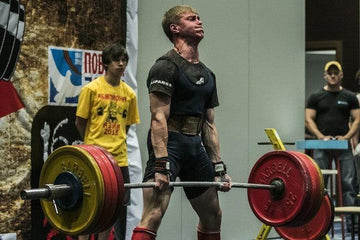

HMB Increases Muscle Mass
Table of Contents
HMB Increases Muscle Mass
by: Robbie Durand
β-Hydroxy-β-methylbutyrate (HMB), a leucine derived metabolite, has been demonstrated to augment strength and lean muscle gains when supplemented in conjunction with resistance training . While HMB has displayed robust anabolic/anticatabolic properties, the underlying mechanisms regarding its efficacy are not completely understood. Recently, an 18% increase in strength gain was demonstrated following 12 weeks of HMB ingestion compared to placebo in experienced resistance trained men.
To examine the endocrine response to a bout of heavy resistance exercise following acute β-hydroxy-β-methylbutyrate free acid (HMB-FA) ingestion. Twenty resistance trained men were randomized and consumed either 1 g of HMB-FA or placebo, 30 minutues prior to performing an acute heavy resistance exercise protocol. They put the men through their paces with leg training exercises: squats, dead-lifts and split-squats. Blood was obtained before, immediately after, and 30 min after exercise. The researchers examined circulating concentrations of testosterone, growth hormone (GH), insulin-like growth factor (IGF-1), and insulin. At the end of the study, the resistance exercise protocol resulted in significant elevations from in testosterone, GH, and insulin.
HMB supplementation had no effect on insulin and testosterone, but did have an effect on increasing growth hormone and IGF-1. The researchers concluded that HMB-FA prior to resistance exercise augments the GH response to high volume resistance exercise compared to placebo. The researchers suggested that HMB-FA may increase the GH/IGF-1 axis through similar pathways as its leucine. Leucine has also been demonstrated to stimulate modest increases in GH concentrations when taken orally. The results of this study also provide evidence supporting a potentially greater anabolic response associated with HMB supplementation. These findings provide further support for the potential anabolic benefits associated with HMB supplementation. Considering that one of the physiological roles of GH is to stimulate fat burning, the significantly greater GH response in HMB-FA may provide further insight for the changes in body composition observed in several studies examining the efficacy of HMB.
- J. M. Wilson, R. P. Lowery, J. M. Joy et al., “The effects of 12 weeks of beta-hydroxy-beta-methylbutyrate free acid supplementation on muscle mass, strength, and power in resistance-trained individuals: a randomized, double-blind, placebo-controlled study,” European Journal of Applied Physiology, vol. 114, no. 6, pp. 1217–1227, 2014.
- W. J. Kraemer, D. L. Hatfield, J. S. Volek et al., “Effects of amino acids supplement on physiological adaptations to resistance training,” Medicine and Science in Sports and Exercise, vol. 41, no. 5, pp. 1111–1121, 2009. V
- S. Nissen, R. Sharp, M. Ray et al., “Effect of leucine metabolite β-hydroxy-β-methylbutyrate on muscle metabolism during resistance-exercise training,” Journal of Applied Physiology, vol. 81, no. 5, pp. 2095–2104, 1996.
- P. Gallagher, J. Carrithers, M. Godard, K. Schulze, and S. Trappe, “β-Hydroxy-β-methylbutyrate supplementation during resistance training,” Medicine & Science in Sports & Exercise, vol. 31, no. 5, p. S402, 1999. View at Google Scholar
- Townsend JR, Hoffman JR, Gonzalez AM, Jajtner AR, Boone CH, Robinson EH, Mangine GT, Wells AJ, Fragala MS, Fukuda DH, Stout JR. Effects of β-Hydroxy-β-methylbutyrate Free Acid Ingestion and Resistance Exercise on the Acute Endocrine Response. Int J Endocrinol. 2015;2015:856708.

















